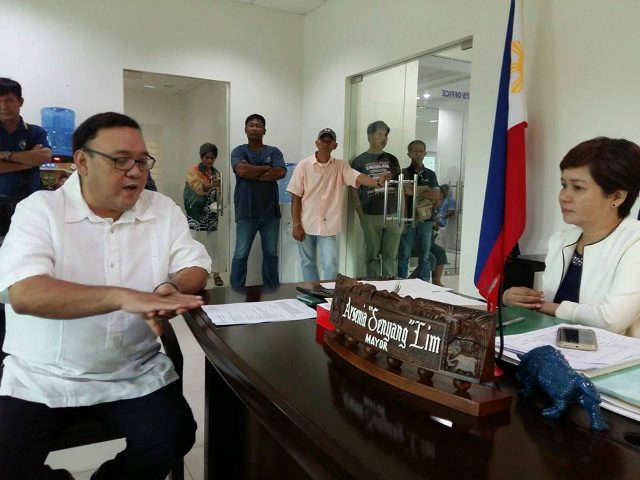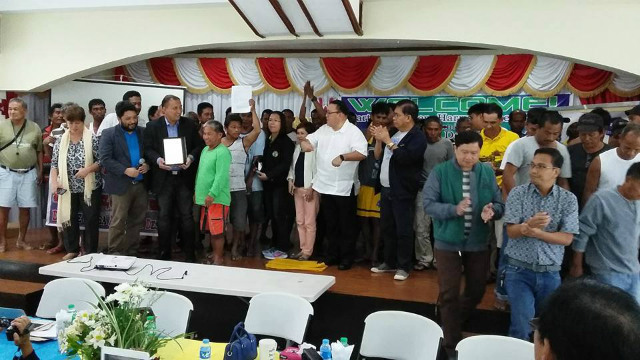SUMMARY
This is AI generated summarization, which may have errors. For context, always refer to the full article.


MANILA, Philippines – Presidential Spokesperson Harry Roque scored Rappler for writing “without consideration of the proper context” about one of his previous statements – that China is an “aggressor under international law.”
The “proper context,” Roque said on Sunday, March 11, was “a fundamental change in circumstance.” He was referring to the Hague ruling in 2016 that upheld the Philippines’ rights over the West Philippine Sea.
Roque said that with this ruling, the Philippines can “move forward” on non-controversial matters, such as trade, investment, and tourism, and “proceed through bilateral talks” on controversial issues, such as the ownership of land territory.
But what did Roque say soon after the Philippines won its case in the Hague, and before he became the mouthpiece of President Rodrigo Duterte?
A 2016 document showed that even with the “fundamental change in circumstance” that was the Hague ruling, Roque still slammed China for violating human rights of Filipino fishermen in Scarborough Shoal (Panatag Shoal).
On August 12, 2016, a month after the Philippines won in the Hague, Roque and two other lawyers – Romel Bagares and Gilbert Andres – wrote an “urgent manifestation” to 3 United Nations (UN) officials.
Their appeal was about “the massive and gross human rights violations committed against Filipino fishermen in the fishing grounds of the Scarborough Shoal (Panatag Shoal or Bajo de Masinloc) by the state agents of the People’s Republic of China.”
Citing Hague ruling
One of the UN officials they wrote to was Zeid Ra’ad Al Hussein, the UN High Commissioner for Human Rights.
Zeid is the same UN official whom Roque, as Duterte’s spokesman, recently taunted because he and his countrymen “do not have democracy in his home state of Jordan.” (READ: Roque hits UN human rights chief’s ‘crude language’)
The two others they wrote to were Hilal Elver, UN special rapporteur on the right to food, and Idriss Jazairy, UN special rapporteur on the negative impact of the unilateral coercive measures on the enjoyment of human rights.
In their letter to Zeid and the two other UN officials, Roque and his fellow lawyers represented 54 Filipino fishermen victimized by Chinese human rights violations.
Roque, Bagares, and Andres quoted the 2016 Hague ruling that said, “The Tribunal finds that China has, through the operation of its official vessels at Scarborough Shoal from May 2012 onwards, unlawfully prevented Filipino fishermen from engaging in traditional fishing at Scarborough Shoal.”
The Filipino lawyers appealed to Zeid and the other UN officials to exert their “moral influence” and “urgently intervene, remind, and direct China and its state agents to respect the human rights” of Filipino fishermen.
Roque to UN execs: ‘Express grave concern’
Roque and his fellow lawyers also called on the 3 UN officials to urgently “investigate the human rights violations committed by China and its state agents” against Filipino fishermen in Scarborough Shoal.
At the same time, they urged the UN officials “to express grave concern on the human rights violations committed by China and its state agents.”

Since the time Roque co-wrote this letter, the Duterte administration has said Filipino fishermen “are back exercising their livelihood in Scarborough Shoal,” thanks to “positive neighborly relations” with China.
Filipino fishermen can fish there again, however, because China allows them.
The Philippines doesn’t need China’s permission, in the first place, because the Hague tribunal classified Scarborough as common fishing grounds.
Chinese Foreign Ministry spokesperson Hua Chunying said that in 2016, “based on the friendliness between China and the Philippines, China made proper arrangement for fishing activities by Philippine fishermen in relevant part of waters near Huangyan Dao,” the Chinese name of Scarborough.
Scarborough, said Hua, “has been an inherent part of Chinese territory.”
Still, Roque relies on China’s “good faith.”
“The President recognizes the principle of good faith in international relations. China has told the President they do not intend to reclaim Scarborough and we leave it at that,” Roque said on November 7, 2017.
The other “fundamental change in circumstance” since 2015, when he called China an “aggressor,” is that he is now Duterte’s spokesman. (READ: Harry Roque pirouettes for Duterte) – Rappler.com
Add a comment
How does this make you feel?
There are no comments yet. Add your comment to start the conversation.